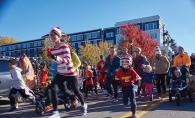“I know I sound like a broken record, but the word I always use is ‘profound,’ ” Colleen Haggar says. Haggar is referring to the Learn program at Cargill, where she is the work experience coordinator. The program pairs with the Hopkins, St. Louis Park and Minnetonka school districts to provide job skill and career training for 18- to 21-year-old adults with disabilities. Like an internship, students go to work every day at Cargill’s Excelsior Crossings campus.
Jan Bootsma of Minnetonka Public Schools says, “A lot of people don’t know that school systems are required to provide transitional and educational services to kids until they’re 21. The focus is on building functional skills so they can be as independent as possible when they leave.”
The program is the brainchild of Jan Ormasa, special education director at Hopkins High School. She felt that a hands-on approach was the best way to build skills. “Her passion, innovation and risk-taking pushed us to try it,” Bootsma says.
The main goal of Learn is to support students’ career exploration and give them entry-level job skills. The students can choose from jobs in 12 different departments, including information technology, mail room, benefits, food service, payroll and human resources. Staff in these departments volunteer their time and provide the students an opportunity to learn under their guidance. Students apply to the program with as much rigor as they would for any job. They submit a resume, letters of recommendation and references. Each term is five weeks, with three separate rotations so that the students can try different jobs and learn a variety of skills.
Hillary Hauser, Cargill’s employee relations representative, says the program helps the students with interpersonal skills. “At the end of the year, Colleen has them whipped into shape and understanding why it’s important to be professional.”
Communication, grooming and working with others are also taught. Haggar says, “I want them to see how their attitude impacts their commitment. I ask them, ‘How do you want people to see you? What do you want them to think when they see you in the hallway?’ ”
Haggar also teaches students to advocate for themselves and how best to share that they have a disability without fear of being singled out or passed over. For example, a student might explain “my working style is different; I like to write everything down.”
Molly Cox graduated from the inaugural class and was hired as a contractor on Cargill’s HR Shared Service team. Cox used to imagine her career would be relegated to something “easy,” like child or animal care. “If you asked me five years ago where I’d be, I would never think I’d be working out in real life. Someday I want to be an administrative assistant,” Cox says. “Every day I’m learning something new and gaining more experience. It’s been eye-opening to know that I can learn skills that I didn’t know I had.” Cox also serves as a mentor to a newer student in the program.
Evan Gottsman-Davis is on his second rotation and works in the information technology department. He never saw himself at a desk job, but since working with a mentor he has developed key skill sets and learned to focus. “There are actually jobs I like doing,” he says. “I like my co-workers and supervisors and the work they’re giving me. It’s a great experience for me to try out different things.”
Hauser says the program has been rewarding for Cargill employees. “Our teams and managers have benefited from working with students,” she says. “It’s a paradigm shift for them not to focus on the disabilities but on the abilities. This translates into new ways of looking at talent management.”
The 2010–11 pilot year was an unequivocal success: Nine of the 12 enrollees found jobs or another training program upon graduation. “The experience for these young adults has been profound,” Haggar says. “It’s an extremely valuable, life-changing opportunity.”
&
The Learn program received the 2012 Minnesota State Council on Disability Corporate Mentorship Award.









